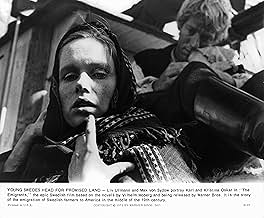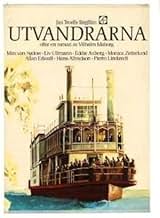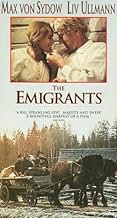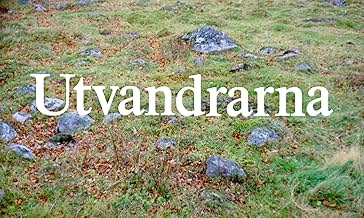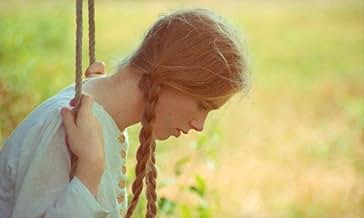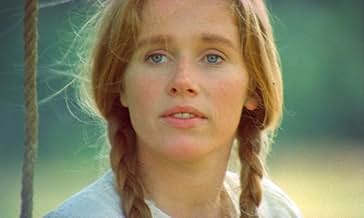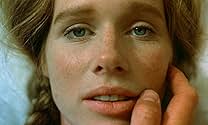अपनी भाषा में प्लॉट जोड़ेंAn 1840s Swedish farming family struggle with their unyielding land and decide to embark on the arduous journey to new hope in America.An 1840s Swedish farming family struggle with their unyielding land and decide to embark on the arduous journey to new hope in America.An 1840s Swedish farming family struggle with their unyielding land and decide to embark on the arduous journey to new hope in America.
- निर्देशक
- लेखक
- स्टार
- 5 ऑस्कर के लिए नामांकित
- 8 जीत और कुल 11 नामांकन
- Nils
- (as Svenolof Bern)
फ़ीचर्ड समीक्षाएं
The characters, played by Ingmar Bergman regulars Max von Sydow, Liv Ullmann and Allan Edwall, face poor harvests, starvation, poverty, religious persecution and even false rumours of bestiality. They look to the US as a place where a farmer can become rich, with even American slavery looking better than their previous situation. Getting to North America, however, will take a rough voyage in which our heroes will face disease, lice and death, and come into psychological conflict with each other. This makes for a strong drama.
Surely one of the best foreign films of the 1970s and a great addition to the strong cinematic year 1971, The Emigrants is an understated but still compelling film, and I look forward to The Criterion Collection's restoration.
Sad to say, because "The Emigrants" is a film that closely examines two very different cultures in an effective and insightful way. A diverse group of Swedish peasants (among them a married couple, a priest, a prostitute, and a young upstart) endure back-breaking labor in their homeland to little profit. They decide to move to the states after being influenced by the exaggerated stories spread abroad (everyone has more than enough food, everyone is filthy rich, etc.). The audience sympathizes with them not just because they endure so much in Sweden, but also because they believe the stories they hear about frontier life in America. Yes, they will obviously have to strive and struggle to survive in their new home, but they are all the more admirable because of their adherence to the American dream.
"The Emigrants" is harsh and often unrelenting in the straightforward way it depicts the realities encountered by the Swedish settlers. The scenes where they travel across the ocean in a small, cramped, and diseased ship are appropriately claustrophobic and terrifying. Later, the family at the center of the story threatens to break up when Liv Ullmann's character, a fragile young mother, loses track of her daughter while hurrying to board a steamboat.
Although most of the characters were better developed in the sequel to this film, "The New Land," Troell's story is very moving in its sincere depiction of how outsiders came to this country to pursue their hopes and dreams.
Few of the characters believe the streets of America are paved with gold. Instead, The Emigrants is a brutally realistic take about struggling and seeing no future in one's homeland and deciding to risk everything in order to have a shot at a better future. The movie is neither cliche nor cynical about the "American Dream." It makes its social points through contrasts and juxtaposition. We see the wealthy Americans aboard a steamboat interspersed with jarring shots of chained slaves below. There also are incredible moments of wonder, like the elderly Swedish woman seeing a steam engine approach for the first time in her life.
The film is an honest and moving portrait about one group of Swedish expats seeking opportunity, whether financial or religious. Perhaps most of all, the movie captures the sense of home and of homelessness for the characters. The chemistry between von Sydow and Ullmann is incredible. Husband and wife, they say they are best friends, and it shows. It's powerful acting.
I would give this film a 9/10, but for the editing. At least a half hour of this film could have been left on the cutting-room floor, particularly in the first half. You could walk away for several minutes and miss nothing. Otherwise, The Emigrants definitely worth seeing.
I was trying to explain one of the most unique things about the film (and its 2nd part, The New Land) to my brother but I was having a hard time finding the words. Finally, "transfixed" was what I was looking for. The film is long but it held me "transfixed" with nearly every scene. The shots are long. The dialog is often sparse. The soundtrack is almost non-existent. Rather, the director holds one nearly spellbound by "showing" rather "telling" the story. The imagery and expressions on the actors' faces and their silent actions relate most of what makes this film so powerful.
As the viewer, you feel almost like you are right there with the characters, sharing the moments along side them. One becomes immersed in what is happening as if you are there. The powerful empathy that the film manages to generate within the viewer is really quite amazing given the lack (or maybe due to the lack) of modern cinematic styles and techniques.
Another thing about this film that is incredibly impressive is that the viewer really gets a sense of how someone migrating from Sweden at the time would see things and think. The perspective is fresh and unapologetically authentic. Unlike many films set in the past, it does not "dumb-down" any aspect by modernizing or "updating" anything to make it easier for a modern audience to relate to (language, mannerisms, music, etc.). One of my biggest peeves about modern films set in the past is that, other than the wardrobe, everything else is modern... modern language, modern manners, modern politics/norms, modern music (electric guitar in the soundtrack of a "western" film?). It is also refreshingly unpolluted by modern-day political correctness.
This is really a fantastic work of art that in many ways, gets better with time as it is so accurate and truthful to the situation and period. The 2nd part, "The New Land" is equally as fantastic. It is not a "sequel" per se, but rather the filmmaker realized he would need several hours to accurately portray the story set out in the book and one movie would be too long. So, it was essentially shot as one long movie but released in two parts in back-to-back years.
This film really provides the viewer with an authentic sense of the times and the situations many emigrants went through in the mid-19th century. One of the best film discoveries I've made in a long time. Highly recommended.
The first part of the film details the challenges these people face that make them want to emigrate in the first place. An oppressive village hierarchy in which all laws and rules of accepted behavior are arbitrated by a self-appointed few, as well as conditions that make farming a constant struggle, leave them craving the freedoms and fertility of the mythic U.S. The second part of the film is a meticulous recreation of what the actual journey was like, including a long segment about the miseries of crossing the Atlantic Ocean (including sea sickness and lice), and the interminable trek up the Mississippi River to Minnesota once they landed. It's almost impossible to wrap your head around how frightening this entire experience would have been for them. These people knew almost nothing about the world outside of their small Swedish village (one young man doesn't even know how the ocean works and thinks they're all going to drown if the water rises) and trust themselves to strangers who don't speak their language or really have any reason to look out for their interests. It's a fascinating film and feels more like a documentary than a fictional narrative.
Unfortunately, the only version I was able to see was the dubbed one shown by TCM. I would have much preferred to see it subtitled so that I could experience von Sydow's and Ullmann's performances as they were meant to be experienced.
"The Emigrants" was nominated for Best Foreign Language Film at the 1971 Academy Awards, and then because of Oscar's weird eligibility rules popped up again a year later with four nominations, for Best Picture, Best Director (Jan Troell), Best Actress (Ullmann), and Best Adapted Screenplay. At the time, it was only the third foreign language film after "Grand Illusion" and "Z" to receive a Best Picture nomination. And the film's sequel, "The New Land," was up for Best Foreign Language Film the same year that "The Emigrants" was in the Best Picture race. Good couple of years for director Jan Troell.
Grade: A
क्या आपको पता है
- ट्रिवियाWhen filming the scene towards the end, where Karl Oskar walks off to find a better place for his settlement, director Jan Troell forgot to yell, "Cut." Max von Sydow just kept walking and walking, waiting for a "cut", and nobody realized until they took lunch.
- गूफ़On the train west a character shows an American silver coin and yells out it has "In God We Trust" on it. The scene is the 1850s and the motto was not added to American silver coins until 1867.
- भाव
Arvid: What do you think it will cost to ship us there?
Robert: Around 200 riksdaler.
Arvid: Ya, well, might as well forget it. 200 riksdaler. I'll never have that much.
Robert: You don't have it?
Arvid: I will go anyway. We can travel to America on foot.
Robert: Nah, there's an ocean. You can't go on foot to America.
Arvid: Do you mean there is no way?
Robert: I'm afraid there is not. America is an island.
Arvid: Damned ocean.
- इसके अलावा अन्य वर्जनThe USA television version, retitled "The Emigrant Saga", consists of this film plus its sequel, Nybyggarna (1972), joined and re-edited together in chronological order and dubbed in English.
- कनेक्शनEdited into Spisok korabley (2008)
टॉप पसंद
- How long is The Emigrants?Alexa द्वारा संचालित
विवरण
बॉक्स ऑफ़िस
- US और कनाडा में सकल
- $11,56,554
इस पेज में योगदान दें


